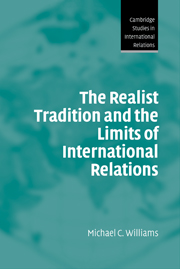Book contents
Introduction
Published online by Cambridge University Press: 22 September 2009
Summary
Few claims are as enduring, powerful, and controversial in the study of world politics as that of being a Realist. To some, being a Realist represents the height of wisdom: the mark of a clear-sighted ability to understand the world the way it is, a willingness to confront the dynamics of power and interest that are held to govern world politics. To others, Realism is a mark of failure: morally obtuse and historically anachronistic, it represents a lack of political understanding and imagination that is misleading at best, pernicious and destructive at worst. Yet whatever stance one takes, there is little doubt that despite continual declarations of its irrelevance or imminent demise, Realism remains at the heart of theoretical and political dispute in world politics, constituting a continuing reference point against which competing positions consistently define themselves and a conceptual and rhetorical fulcrum around which both analytic and political debates revolve.
Throughout the 1990s, Realism seemed on the defensive. The end of the Cold War, it was widely argued, demonstrated its limitations all too clearly, while emerging dynamics — from state fragmentation, to globalisation, to environmental degradation — presented challenges that Realism was ill equipped to analyse, and even less well suited to address. Even amongst its supporters, the question ‘Is Realism Finished?’ seemed to emerge with new urgency; and although they almost invariably answered their rhetorical question with a rather predictable ‘no’, the frequency with which it was asked illustrated the pervasiveness of the challenge and the breadth and sophistication of Realism's critics.
- Type
- Chapter
- Information
- Publisher: Cambridge University PressPrint publication year: 2005



